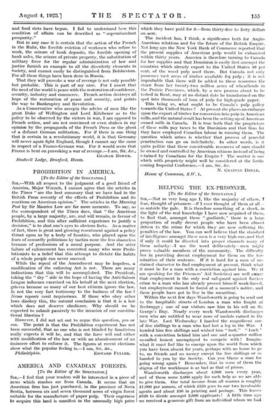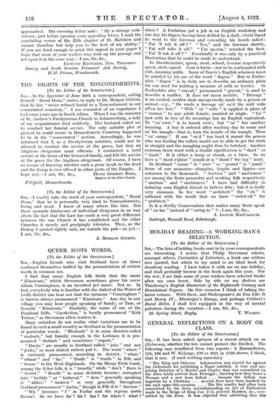HELPING THE EX-PRISONER.
[To the Editor of the SPECTATOR.]
Stn,—Not so very long ago I, like the majority of others, T fear, thought of prisoners—if I ever thought of them at all— as outside the pale. It is therefore something of a shock, in the light of the real knowledge I have now acquired of them, to find that, amongst these " gaolbirds," there is a large proportion of really decent people who have been almost driven to the crime for which they are now suffering the penalties of the law. You can well believe that the standard of intelligence amongst these men is a very high one,and that if only it could be directed into proper channels many of these unlucky—I use the word deliberately—men might prove valuable members of the community. The difficulty lies in providing decent employment for them on the ter- mination of their sentence. If it is hard for a man of un- stained character to find employment at present, think what it must be for a man with a conviction against him. We (I am speaking for the Prisoners' Aid Societies) are well aware that employment is the only real safeguard against further crime to a man who has already proved himself weak-kneed, but employment cannot be found at a moment's notice, and these people have got to live in the meantime.
Within the next few days Wandsworth is going to send out to the hospitable streets of London a man who fought at Zeebrugge ; one of our visitors saw him in his cell on St. George's Day. Nearly every week Wandsworth discharges men who are entitled to wear rows of medals earned in the late War. Last Wednesday I handed the magnificent SMI7 of five shillings to a man who had lost a leg in the War. I handed him five shillings and wished him " luck." " Luck " with a conviction behind him and one and a-quarter million so-called honest unemployed to compete with I Imagine what it must feel like to emerge upon the world from which you have been absent for years, perhaps with no home to go to, no friends and no money except the five shillings or so handed to you by the Society. Can you blame a man for going wrong again ? Remember, that to some of them the stigma of the workhouse is as bad as that of prison.
Wandsworth discharges about 4,000 men every year, and of these some 2,000 apply for such help as we are able to give them. Our total income from all sources is roughly £1,000 per annum, of which £350 goes to our two invaluable agents and about £30 in printing and postage. This leaves £620 to divide amongst 2,000 applicants ! A little time ago we received a generous gift from an individual whom we had approached. His covering letter said : " By a strange coin- cidence, just before opening your appealing letter, I read the concluding verses of the 25th chapter of St. Matthew and cannot therefore but help you to the best of my ability." If you are kind enough to print this appeal in your paper I hope that some of your readers may look up the passage and act upon it in the same way.—I am, Sir, &C., EDMUND KENNARD, Hon. Treasurer. Surrey and South London Prisoners' Aid Society, H.M. Prison, Wandsworth.



































 Previous page
Previous page